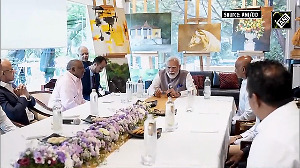At present, US investors can buy only a handful of Indian stocks listed on the New York and Nasdaq exchanges through an American Depository Receipt (ADR) authorisation.
USFE's US dollar-denominated Sensex futures contract will trade 23 hours a day and settle monthly to the corresponding value of the BSE's futures contract. The contract will have a notional value of 40,000 and a tick size of $5.
Following the curbs on participatory notes (P-notes), analysts expect hedge funds and other investors, who are denied direct entry into Indian markets, to take an exposure to Indian stocks through the Sensex futures in USFE, which, was formed in 2006 following the Man Group's investment in the former Eurex US.
"Expected market participants include hedge funds and institutions, international mutual funds and individuals seeking investments in Indian markets," said senior USFE and BSE officials.
At the moment, there are two products available for foreign investors, which are benchmarked against the Indian stock markets.
An ETF on the Sensex, listed on the Hong Kong Stock Exchange and an index futures on the Singapore Exchange based on NSE's Nifty.
Though BSE currently offers rupee-denominated Sensex futures to qualified Indian market participants, the rival National Stock Exchange's S&P CNX Nifty Index is the most actively traded index-based derivatives.
The daily trading volume in the Sensex futures is just about Rs 1,000 crore whereas the derivatives trading on the NSE's Nifty index clocks an average daily turnover of Rs 40,000-50,000 crore (Rs 400-500 billion).
"Exposure to emerging markets, particularly India, is now essential for institutional portfolio management and retail investors alike," said Kevin Davis, Chairman, USFE.
"This agreement will provide the opportunity for US investors to gain exposure to India's unprecedented economic growth, expansion and investment performance."
Rajnikant Patel, managing director and CEO, BSE, said the launch of a futures contract based on the Sensex would facilitate overseas investors in taking exposure to the Indian equities.
"I am confident the listing of the dollar-denominated Sensex contract on USFE will elicit a very positive response from the international investing community," he said.
Patel said the Sensex futures contract on USFE would allow foreign investors to do arbitrage trades on the Indian and the US exchange.
"The Sensex futures product is an ideal fit for USFE's global distribution model and commitment to innovation," said Satish Nandapurkar, CEO of USFE.
"USFE's listing of the Sensex will provide US market participants with direct access to pure Indian equities exposure through existing futures accounts."







 © 2025
© 2025